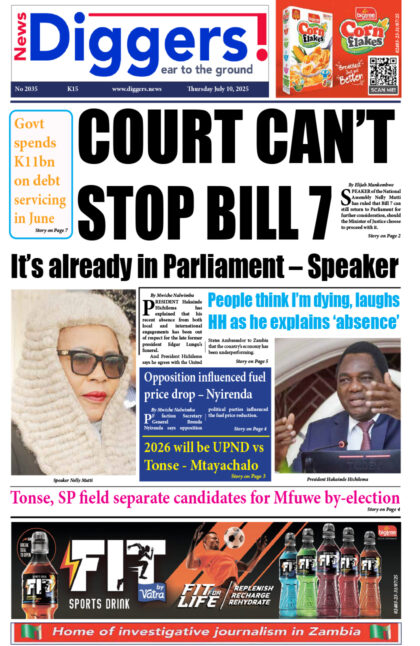FORMER Zesco board chairperson Mbita Chitala says he did not allow Zesco to be used as a source of illicit funds meant to pay for Industrial Development Corporation’s bloated salaries.
In his book, entitled “CORPORATE CAPTURE: THE POLITICAL ECONOMY OF ELECTRICITY MANAGEMENT IN ZAMBIA”, Chitala said all actions of the IDC were unlawful because the Public Finance Management Act number 1 of 2018 did not provide for their powers.
“The Public Finance Management Act Number 1 of 2018 was meant to control and regulate state corporations. The Act created roles for the Presidency, the Parent Ministry, the Treasury, the Board of Directors, the Auditor General and the Legislature. The Act, however, did not provide for the powers of the Industrial Development Corporation (IDC). The lawful way should have been either the amendment of the Act to include the role of the IDC or the Minister of Finance to publish and gazette a Statutory Instrument delegating his powers of controlling public enterprises to the IDC. This was never done and all actions of the IDC were therefore unlawful from the beginning,” he said.
“This is what made the relationship between me and the IDC unpalatable as I persuaded my colleagues on the ZESCO board to decline to implement several of the IDC management instructions on grounds of illegality. The justification for having this kind of complex network of institutions controlling public enterprises in Zambia lay in the fact that public enterprises like ZESCO were public investments which had to be subjected to public scrutiny to ensure that they were, as for ZESCO, able to perform the important public function of generating, transmitting and distributing electricity to the wide populace of Zambia.”
He said Zesco was subject to interference by the politicians and bureaucrats who run the government.
“The President of Zambia commanded enormous authority on ZESCO and his powers included the establishment of ZESCO Limited, the appointment of members of the ZESCO Board of Directors. including the Chairperson of ZESCO as well as senior management of ZESCO. Furthermore, the President had powers to revoke the appointment of any member of the board and so on. Similarly, the Minister of Finance under the Minister of Finance (Incorporation) Act could dissolve the Board of Directors of any inefficient state owned enterprise. Furthermore, the Companies Act Number 10 of 2017 provided for the limitations on powers of director of a company such as ZESCO Limited and provided for the liabilities that directors would incur for breach of duty which could include a director suffering imprisonment. ZESCO Limited was a government company in which all paid up capital was held by the Minister of Finance. It was registered under the Companies Act and was fully governed by the provisions of the Act.” Chitala said.
“The company had both advantages and disadvantages. The advantages included the following: It was free to raise finance from financial institutions and other companies apart from government funding; It enjoyed flexibility and autonomy in functioning and was managed with a commercial outlook; It could attract foreign capital as was the case with the US$2 billion investment in Kafue Gorge Lower Power Station; It was relatively free from bureaucratic control and so on. ZESCO Limited also had several drawbacks. The most apparent one was that it was subject to interference by the politicians and bureaucrats who run government.”
Chitala said he had found it difficult to obey instructions sent by IDC and this was used to persuade the President to relieve him of his appointment as Zesco board chairman.
“This section of the book provides instances where I as Chairman and supported by the Board of Directors and management found it difficult to obey the many instructions sent to me by the IDC and this was used to persuade the President to relieve me of my appointment as chairman and member of the Board of Directors. The first instance was the ZESCO refusal to accept the IDC instruction for ZESCO Limited to start paying IDC management fees. In a circular letter sent to me and signed by the IDC Chief Executive Officer Mr. Mateyo Kaluba, the letter being dated 18th November, 2019, I was informed that the IDC was from 1st January, 2020 going to implement management fees for oversight and other management services allegedly provided by IDC to ZESCO,” Chitala said.
“Part of Kaluba’s letter read as follows: ‘In implementing Management Fees, the following should be noted: (1) management Fees will apply only to services provided by the IDC to each subsidiary or to the Group as a whole; (2) management fees will be charged on a computed cost recovery basis using a flat monthly rate; (3) IDC will enter into Management Services Agreements with each subsidiary. Each contract will specify the scope of Management Services to be provided by IDC and the applicable management fees; (4) Each month, the IDC will invoice subsidiaries. Payments by subsidiaries are to be paid by the 20th of every month for management services to be provided during that month; (5) Budgets of all subsidiaries should provide for the management fees beginning 1st January, 2020. The Boards of all subsidiaries are expected to ensure implementation and compliance with the guidance provided’. ”
He said the IDC was not supposed to be actively involved in business operations because it was a holding company on behalf of the Minister of Finance.
“The purpose of the Minister of Finance registering the IDC as a company limited by shares and delegating to it to act as a holding company was to allow the Ministry of Finance a way of limiting their liability, create a streamlined management and maintain ownership over each business. The IDC was to provide a central point of control over the businesses owned by the Ministry of Finance. The IDC held equity interest or assets on behalf of the Minister of Finance as corporate sole and the IDC was not supposed to be actively involved in business operations. As a holding company on behalf of the Minister of Finance, the IDC had delegated authority,” he said.
“The IDC did not manufacture or sell any products or services or conduct any other business operations. Its purpose was simply to hold the controlling stock or membership interest in other companies owned by the Ministry of Finance. How was it to make money? This was not stated in the law and it could only be assumed that the Minister of Finance would provide for that using an appropriate law. Ordinarily, the IDC could make money when the companies they owned made money. They could either sell their shares in any business for profit or if the subsidiary paid dividends, the IDC as a holding company would, with the authority of the Minister of Finance, receive cash dividends that it could then use to pay salaries and for other investments. This was my understanding of the role of the IDC in the absence of a statutory direction by the Minister of Finance pursuant to the Minister of Finance (Incorporation) Act.”
Chitala said IDC’s proposal for Zesco to pay Management Fees was an unlawful way of attempting to use ZESCO as a cash cow.
“On the grounds of my interpretation, I advised the ZESCO management to ignore the IDC directive as I considered what the IDC were proposing was simply an unlawful way of attempting to use ZESCO as a cash cow. This refusal to pay management fees were also anchored on the fact that ZESCO was in reality an insolvent entity and any payment of fees would reduce its capital base. It was common knowledge that fees could only be paid from profits and not from the capital of a going concern. This refusal by ZESCO to pay management fees to IDC was not well received by the bureaucrats at the IDC as this blocked their source of illicit funds from a public enterprise to pay for their bloated salaries,” said Chitala.




















One Response
This makes sad reading. But under the previous regime, this was a “new normal”, anyway! The boys went to town ransacking everything in their way!!